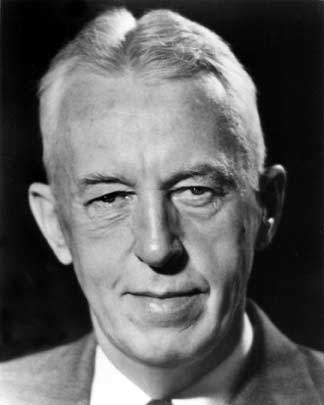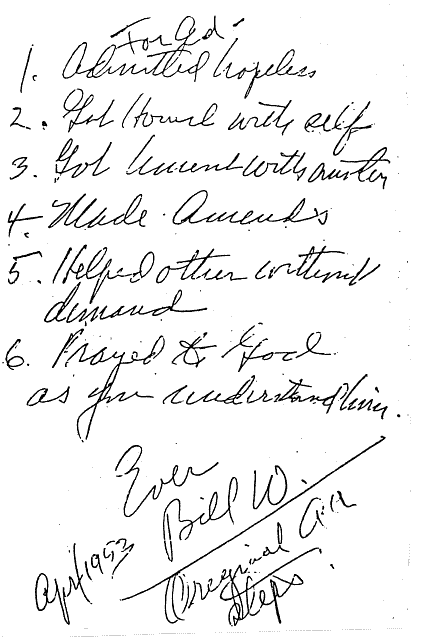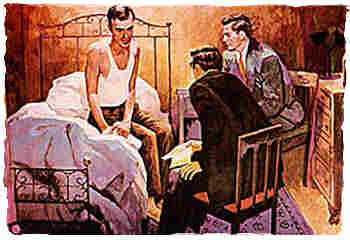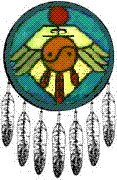
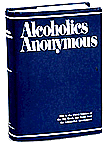
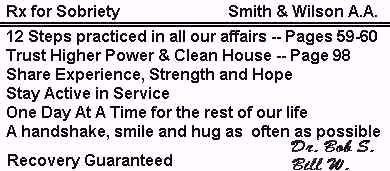 Click The Images To Go To Page Indicated In The Flag
The Links In The Chain Bill was introduced to the committee by Marty Mann, the first woman to achieve permanent sobriety in Alcoholics Anonymous, and the founder of the National Committee On Alcoholism.
b. November 26, 1895. d. January 24, 1971 Co-Founder of Alcoholics Anonymous Well folks, our world is certainly a world of contrast. It was only a few years ago that Westbrook Pegler wrote a piece in which he described Dr. Bob and me as "the wet brain founders of Alcoholics Anonymous." But very seriously and very happily, too, I think that the A.A.'s present in and out of this Committee and everywhere join in with Lois and me and are able to say that this is one of the finest hours that has yet to come to us. Some people say that destiny is a series of events held together by a thin thread of change or circumstance. Other people say that destiny is composed of a series of events strung on a cord of cause and effect and still others say that the destiny of good work is often the issue of the will of God and that he forges the links and brings the events to pass. I've been asked to come here to tell the story of A.A. and in that story, everyone here I am sure can find justification for either of those points of view. But, I want to tell more than the story of A.A., this time. I was beset, I must confess, by a certain reluctance, and the reluctance issues out of this fact, of course everybody is fairly familiar with the fact that I once suffered from alcoholism, but people are not so wise to the fact that I suffer also from schizophrenia, split personality. I have a personality say as a patriarch of A.A., founding father, if you like, and I also have a personality as an A.A. member and between these personalities is a terrific gulf. You see, a founding father of A.A. has to stand up to the A.A. Tradition which says that you must not endorse anything or anybody or even say good things about your friends on the outside or even of Beemans chewing gum lest it be an endorsement. So as the father of A.A. I am very strictly bound to do nothing but tell the story of our society. But as an A.A. member like all the rest, I am an anarchist who revels in litter so I'm really going to say what I damn please. So, if only you will receive me as Mr. Anonymous, one of the poor old drunks still trying to get honest! Now to our narrative and to the first links in the chain of events that has led us to this magnificent hour. I was by no means the first link in this chain and only one of very many. I think the founder business ought to be well deflated and I'm just going to take a minute or two to do it. As a fact, the first link in the chain was probably forged about twenty-five years ago in the office of a great psychiatrist, Carl Jung. At that time he had as a patient a certain very prominent American businessman. They worked together for a year. My business friend Rolland was a very grim case of alcoholism and yet under the doctor's guidance he thought he was going to find release. He left the doctor in great confidence but shortly, he was back drunk. Said he to Dr. Jung, "What now, you're my court of last resort." The doctor looked at him and said, "I thought that you might be one of those rare cases that could be touched with my art, but you aren't. I have never seen," continued Doctor Jung, "one single case of alcoholism recover, so grave as yours under my tutelage." Well, to my friend Rolland this was tantamount to a sentence of death. "But doctor," said he, "is there no other course, nothing else." "Yes," said Dr. Jung, "there is something. There is such a thing as a transforming spiritual experience." "Well," Rolland beamed, "after all I've been a vestryman in the Episcopal Church, I'm a man of faith." "Oh," Dr. Jung said, "that's fine so far as it goes, but it has to go a lot deeper. I'm speaking of transforming spiritual experiences." "Where would I find such a thing," asked Rolland. Dr. Jung said, "I don't know, lighting strikes here or there, it strikes any other place. We don't know why or how. You will just have to expose yourself in the religion of your own choice or a spiritual influence as best you can and just try and ask and maybe it will be open to you." So my friend Rolland joined up with the Oxford Groups, the sometime Buchmanites of that day, first in London and then came to New York and lo and behold the lighting did strike and he found himself unaccountably released of his obsession to drink. After a time he heard of a friend of mine, a chap we call Ebby, who sojourned every summer in Vermont. An awful grim case, he had driven his father's bright, shiny new Packard into the side of someone's house. He had bashed into the kitchen, pushing aside the stove and had said to the startled lady there, "How about a cup of coffee." The neighbors thought that this was enough and that he needed to be locked up. He was taken before Judge Graves in Bennington, Vermont, a place not too far from my home by the way, and there our friend Rolland heard of it and gathering a couple of Oxford Groupers together, one of them an alcoholic, the other just a two fisted drinker. They took Ebby in tow and they inoculated him with very simple ideas: that he, Ebby, could not do this job on his own resources, that he had to have help; that he might try the idea of getting honest with himself as he never had before; he might try the idea of making a confession of his defects to someone; he might try the idea of making restitution for harms done; he might try the idea of giving of himself to others with no price tag on it; agnostic though he was, he might try the idea of praying to whatever God there was. That was the essence of what my friend Ebby abstracted from the Oxford Groups of that day. True, we later rejected very much of the other things they had to teach us. It is true that these principles might have been found somewhere else but as it happens they were found there. Ebby for a time got the same phenomenon of release and then he remembered me. He was brought to New York and lodged at Calvary Mission and soon called me up while I lay home drinking in Brooklyn. I will never forget that day as suddenly he stood in the areaway. I hadn't seen him for a long time. By this time I knew something of the gravity of my plight. I couldn't put my finger on it but he seemed strangely changed, besides he was sober. He came in and began to talk. I offered him some grog. I remember I had a big jug of gin and pineapple juice there, the pineapple juice was there to convince Lois that I wasn't drinking straight gin. No, he didn't care for a drink. No, he wasn't drinking. "What's got into you," I asked. "Well," he said, "I've got religion." Well, that was rough on me. He's got religion! He had substituted religious insanity for alcoholic insanity. Well, I had to be polite so I asked, "What brand is it." And, he said, "I wouldn't exactly call it a brand. I've come across a group of people who have sold me on getting honest with myself; who sold me on the idea that I am powerless over my problems, and have taught me to help others, so I'm trying to bring something to you, if you want it. That's it." So, in his turn, he transmitted to me these simple ideas across the kitchen table. We admitted we were licked. Meanwhile, another chain of events had been taking place. In fact, the earliest link in that chain runs back to William James who is sometimes called the father of modern psychology. Another link in the chain was my own Doctor William Duncan Silkworth, who I think will someday be counted as a medical saint. I had the usual struggle with this problem and had met Dr. Silkworth at Towns Hospital. He had explained in very simple terms what my problem was: an obsession that condemned me to drink against my will, and increasing physical sensitivity which guaranteed that I would go mad unless I could somehow find release, perhaps through re-education. He taught me the nature of the malady. But here I was, again drinking. But here was my friend talking to me over the kitchen table. Already, you see, the elements which lie today in the foundation of A.A. were already present. The God of science in the persons of Dr. Silkworth and Dr. Jung had said "No" on the matters of psychiatry, psychology and medicine. They can't do it alone. Your will power can't do it alone. So, the rug had been pulled out from under Rolland Hazzard, and Hazzard, an alcoholic, had pulled the rug out from under Ebby, and now he was pulling it out from under me while quoting Dr. Jung and substantiating what Dr. Silkworth had let leak back to me through Lois. So, the stage was really set and it had been some years in the setting before it ever caught up with me. Of course, I had balked at this idea of a power greater than myself, although the rest of the program seemed sensible enough. I was desperate, willing to try anything, but I still did gag on the God business. But at length, I said to myself as has every A.A. member since, "Who am I to say there is no God? Who am I to say how I am going to get well?" Like a cancer patient, I am now ready to do anything, to be dependent upon any kind of a physician, and if there is a great physician, I had better seek him out. So, pretty drunk, I went back to Towns Hospital, was put to bed, and three days later my friend appears again. One alcoholic talking to another across that strange powerful bond that we can effect with each other. In his one hand and in the hands of the doctor was hopelessness, and on the other side was hope. He went through his little list of principles; getting honest, making restitution, working with other people, praying to whatever God there was, then he left. When he had gone, I sunk into a terrific depression, the like of which I had never known and I suppose for a moment the last vestiges of my prideful obstinacy were crushed out at great depth and I cried out like a child, "Now I'll do anything, anything to get well," and with no faith and almost no hope I again cried out, "If there is a God, will He show Himself." Immediately the place lit up in a great light. It seemed to me that I was on a mountain top, there was a sudden realization that I was free, utterly free of this thing and as the ecstasy subsided I am again on the bed and now I'm surrounded by a sense of presence and a mighty assurance and a feeling that no matter how wrong things were, ultimately all would be well. I thought to myself, so this is the God of the preachers. From that day to this, I have scarcely been tempted to drink, so instantaneous and terrific was the release from the obsession. At about the time of my release from the hospital, somebody handed me a copy of William James' book Varieties of Religious Experience. Many of us disagree with James' pragmatic philosophy, but I think that nearly all will agree that this is a great text in which he examines these mechanisms. And in that book of his, great numbers, the great majority of these experiences took off from a base of utter hopelessness. In some controlling area of the individual's life he had struck a wall and couldn't get under, around or over. That kind of hopelessness was the forerunner of the transforming experience, and as I began to read those common denominators stuck out of the cases cited by James. I began to wonder. Yes, I fitted into that pattern but why hadn't more alcoholics fitted into it before now? In other words, what we needed was more deflation at depth to lay hold of this transforming experience. Then comes Dr. Silkworth with the answer, those two little words: the obsession and the allergy. Not such little words, big words, the twin ogres of madness and death, of science pronouncing its verdict of hopelessness so far as our own resources were concerned. Yes, I had had that dose. That had perhaps laid the ground. One alcoholic talking to another had convinced me where no others had brought me any conviction. I began to race around madly trying to help alcoholics, and in gratitude I briefly joined the Oxford Group, but they were more interested in saving the world than other alcoholics. That didn't last too long and I began to tell people of this sudden mystic experience, and I fear that I was preaching a great deal and not one single drunk sobered up for a period of six months. Again, comes the man of medicine, Dr. Silkworth and he said, "Bill, you've got the cart before the horse. Why don't you stop talking about this queer experience of yours and of all this morality. Why don't you pour into these people how medically sick they are and then, maybe coming from you or with the identification you can get with these other fellows, then maybe you'll soften them up so they'll buy this moral psychology." About that time I had been urged to get back into business and quit being a missionary, and I hooked onto a business deal which took me to Akron, Ohio. The deal fell through and for the first time I felt tempted to drink. I was in the hotel with about ten dollars in my pocket and my new found friends had disappeared. I thought to myself, gee, you'd better look for another alcoholic to work with. Then I realized, as never before, how working with other alcoholics had played such a great part in sustaining my original experience. Well, again friends came to the rescue. I went down to the lobby and looked at the Church Directory and absentmindedly drew my finger down the list of names and there appeared a rather odd one, the Reverend Tunks. I said, "Well, I'll call up Tunks" and he turned out to be wonderful Episcopal clergyman. I said that I was a drunk looking for another drunk to work on and tried to explain why. The good man showed some alarm as it wasn't everyday someone called up with my request, but the good man gave me a list of about ten names, some of them Oxford Groupers. I called all of these people up. Well, Sunday was coming and maybe they would see me in Church, some were going out of town. I exhausted that list, all but one. None had time nor cared very much. Something not very strange under the circumstances, so I went down and took another look in the bar and something said to me "You had better call her up." Her name was Henrietta Seiberling and I took her to be the wife of a tire tycoon out there who I had once met, and I thought that this lady certainly isn't going to want to see me on a Saturday afternoon. But I called and she said, "Come right out, I'm not an alcoholic but I think I understand." This led to the meeting with Dr. Bob, one of my many co-partners in this enterprise, and as Dr. Silkworth had suggested, I poured into him how sick we were and that produced his immediate recovery. I went to live in the Smith's house and presently Bob said, "Hadn't we better start working with alcoholics." I said, "Sure, I think we had." We found an opportunity at City Hospital in Akron, who was being brought in with D.T.'s on a stretcher. He'd been hospitalized six times in four months and couldn't even get home without getting stewed. That was to be A.A. number three, the first man on the bed.
Dr. Bob and I went to see him and he said, "I'm too far gone and besides, I'm a man of faith. Nevertheless, we poured it into him, the medical hopelessness of this thing so far as one's own resources are concerned. We explained what had happened to us, we made clear to him his future. And the next morning we came back and he was saying to his wife, "Give me my clothes, we're going to get up and get out of here. These are the men, they are the ones who understand." Right then and there was formed the first A.A. group in the summer of 1935. The synthesis in its main outline was complete. But Lord, we hadn't even started. The struggles of those next few years. A wonderful thing to think about. Terribly slow was our growth. We got way into 1939 before we had produced even a hundred recoveries in Akron and in New York, a few in Cleveland, Ohio. Then, in that year, the Cleveland Plain Dealer ran pieces about us of such strength that the few A.A.'s in Cleveland were flooded with hundreds of cases and that added one more needed ingredient. Up to this time it had been deadly slow. Could this thing spread? Could we get into mass production? Well, in a matter of months, twenty Clevelanders had sobered up several hundred newcomers. But that required hospitalization and we were not liked in the hospitals. Now, I come to the subject of this Committee, it's relation with A.A. and the linkage between us. Meanwhile, great events were going on down here (New York), there had been in preparation a book to be called Alcoholics Anonymous. As a precaution we had made mimeograph copies to be passed around and one of these copies was sent to a man who I consider to be one of the greatest friends that this society can ever have, Dr. Harry Tiebout, the onetime Chairman of this Committee. Harry Tiebout was the man who got me before the medical societies and that took great courage. Well, I'm getting ahead of my story. So Harry got one of the mimeographed copies of the A.A. book and he hands it to a certain patient at the Blythewood Sanitarium in Greenwich, Connecticut. The patient was a lady. She read the book and it made her very mad, so she threw it out the window and got drunk. That was the first impact of Alcoholics Anonymous. Harry got her sobered up and handed her the book again, and a phrase caught her eye, it was a trigger. "We cannot live with resentments," the book said. This time she didn't throw it out the window. Presently she came to our little meeting, and you must remember that we were still less than a hundred strong in the early part of 1939 at our little Brooklyn house at 182 Clinton Street. And she came back from that meeting to Greenwich and made a remark that today is a classic in A.A. She said to a fellow patient and sufferer and friend in the sanitarium, "Grennie, we're not alone anymore, this is it." Well, that was the beginning for Marty. Much help by Harry and Mrs. Willey, the proprietor of the place. Marty started the first group on the grounds of the sanitarium. She began to frantically work with alcoholics and became the dean of our women alcoholics. So our society had made two terrific friends in Dr. Harry and Marty. Now, in the intervening years up to 1944, A.A. itself was in a bad turmoil. The Saturday Evening Post piece had been published which caused 6,000 frantic inquiries to hit our post office box here in New York, from all over the country, indeed, all over the world. So then the great question was posed. Could A.A. spread? Could it function? Could it hang together with it's enormous neurotic content that we have. We just did not know. But again, it was do or die. In old Ben Franklin's words, "We would either hang together or hang separately." Out of this group experience there began to evolve Traditions. Traditions which had to do with A.A.'s unity and function and relation with the world outside and our relations to such things as money, property, prestige, all that sort of thing. The Traditions of Alcoholics Anonymous, with which you folks, for the most part, are familiar. Those principles began to take shape, began to gather for us and little by little, order began to come out of this seething mass of drunks in their quest for sobriety. By now, the membership of the movement had run up into the many thousands and as Marty observed, there was now proof that it can be done. But we were still a long way from today. A.A. still needed friends. Friends of medicine, friends of religion, friends of the press. We had a handful but we needed a lot of friends. The public needed to know what sort of malady this was, and that something could be done about it. This Committee, much like Alcoholics Anonymous, is notable not only for what it has done in its own sphere, but for what it has set in motion. I remember very well when this Committee started. It brought me in contact with our great friends at Yale, the courageous Dr. Haggard, the incredible Dr.Jellinek or Bunky as we affectionately know him, and Seldon [Bacon] and all those dedicated people. The question arose, could an A.A. member get into education or research or what not? Then ensued a fresh and great controversy in A.A., which was not surprising because you must remember that in that period we were like the people on Rickenbacker's raft. Who would dare to rock us ever so little and precipitate us back into the alcohol sea. So, frankly, we were afraid and as usual we had the radicals and we had the conservatives and we had moderates on this question of whether A.A. members could go into other enterprises in this field. The conservatives said, "No, let's keep it simple, let's mind our own business." The radicals said, "Let's endorse anything that looks like it will do any good, let the A.A. name be used to raise money and to do whatever it can do for the whole field," and the growing body of moderates took the position, "Let any A.A. member who feels the call go into these related fields, for if we are to do less it would be a very antisocial outlook." So that is where the Tradition finally sat and many were called and many were chosen since that day to go into these related fields which has now got to be so large in their promise that we of Alcoholics Anonymous are getting down to our right size and we are only now realizing that we are only a small part of a great big picture. We are realizing again, afresh, that without our friends, not only could we not have existed in the first place, but we could not have grown. We are getting a fresh concept in A.A. of what our relations with the world and all of these related enterprises should be. In other words, we are growing up. In fact last year at St. Louis we were bold enough to say we had come of age and that within Alcoholics Anonymous the main outlines of the basis for recovery, of the basis for unity and of the basis for service or function were already evident. At St. Louis I made talks upon each of those subjects which largely concerned themselves about what A.A. had done about these things, but here we are in a much wider field and I think that the sky is the limit. I think that I can say without any reservation that what this Committee has done with the aid of it's great friends who are now legion as anyone here can see. I think that this Committee has been responsible for making more friends for Alcoholics Anonymous and of doing a wider service in educating the world on the gravity of this malady and what can be done about it than any other single agency. I'm awfully partial and maybe I'm a little biased because here sits the dean of all our ladies, my close, dear and beloved friend. So speaking out of turn as a founder, I want to convey to her in the presence of all of you, the best I can say of my great love and affection is Thanks. At the close of things in St. Louis, I remember that I likened A.A. to a cathedral style edifice whose corners now rested across the earth. I remember saying that we can see on its great floor the Twelve Steps of Alcoholics Anonymous and there assembled maybe 150,000 sufferers and their families. We have seen side walls go up, buttressed with the A.A Tradition and at St. Louis, when the elected Conference took over from our Board of Trustees, the spire of service was put into effect and its beacon light, the beacon light of A.A. shone there beckoning to all the world. I realized as I sat here today that that was not a big enough concept, for on the floor of the cathedral of the spirit there should always be written the formula, from whatever source, for release from alcoholism, whether it be a drug, whether it be the psychiatric art, whether it be the ministrations of this Committee. In other words, we who deal with this problem are all in the same boat, all standing upon the same floor. So let's bring to this floor the total resources that can be brought to bear upon this problem and let us not think of unity just in terms of the A.A. Tradition. Let us think of unity among all those who work in the field as the kind of unity that befits brotherhood and sisterhood and a kinship in the common suffering. Let us stand together in the spirit of service. If we do these things, only then can we declare ourselves really come of age. And only then, and I think this is a time not far off, I think we can say that the future, our future, the future of this Committee, of A.A. and of the things that people of good will are trying to do in this field will be completely assured. Thank you. Index of AA History Pages on Barefoot's Domain As in so many things, especially with we alcoholics, our History is our Greatest Asset!.. We each arrived at the doors of AA with an intensive and lengthy "History of Things That Do Not Work" .. Today, In AA and In Recovery, Our History has added an intensive and lengthy "History of Things That DO Work!!" and We will not regret the past nor wish to shut the door on it!!
THE ENDLESS LOVE OF A.A.
On the Web Feb 4, 2002 in the Spirit of Cooperation Three mighty important things, Pardn'r, LOVE And PEACE and SOBRIETY |
